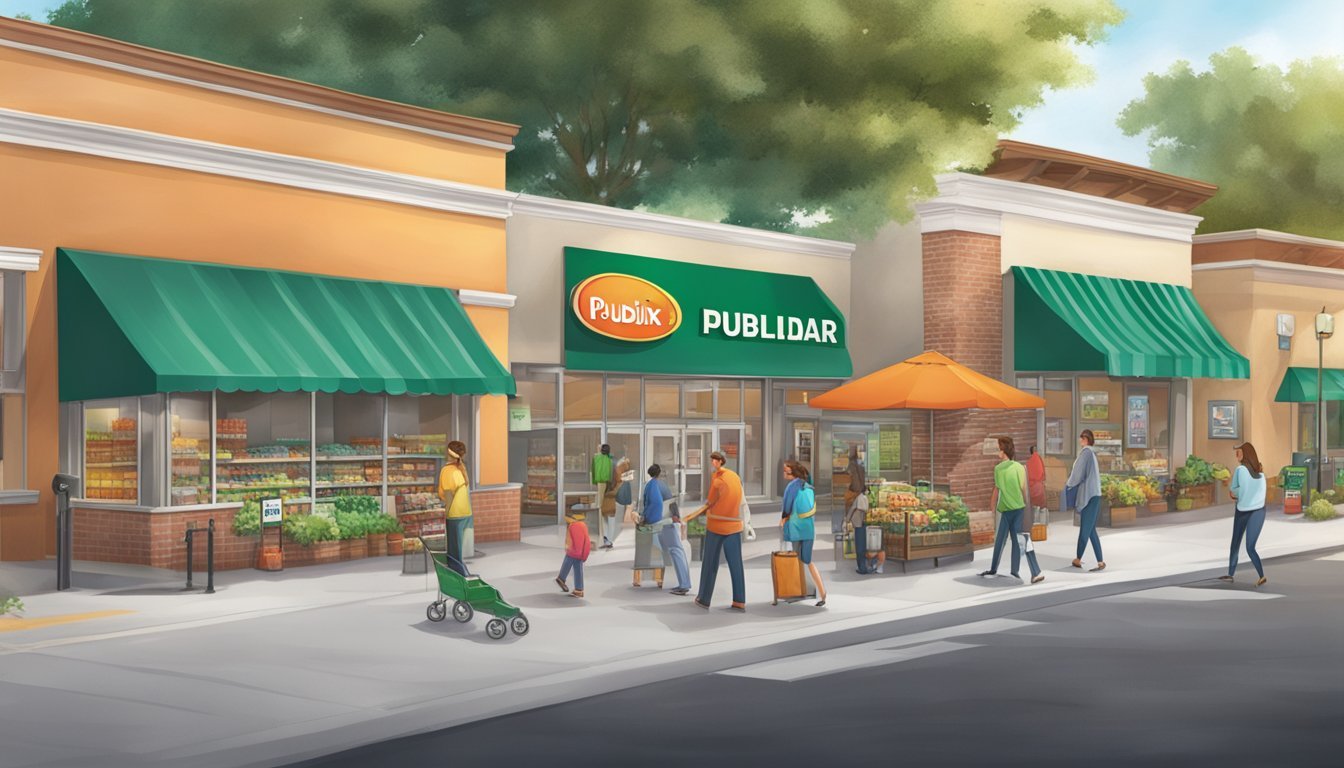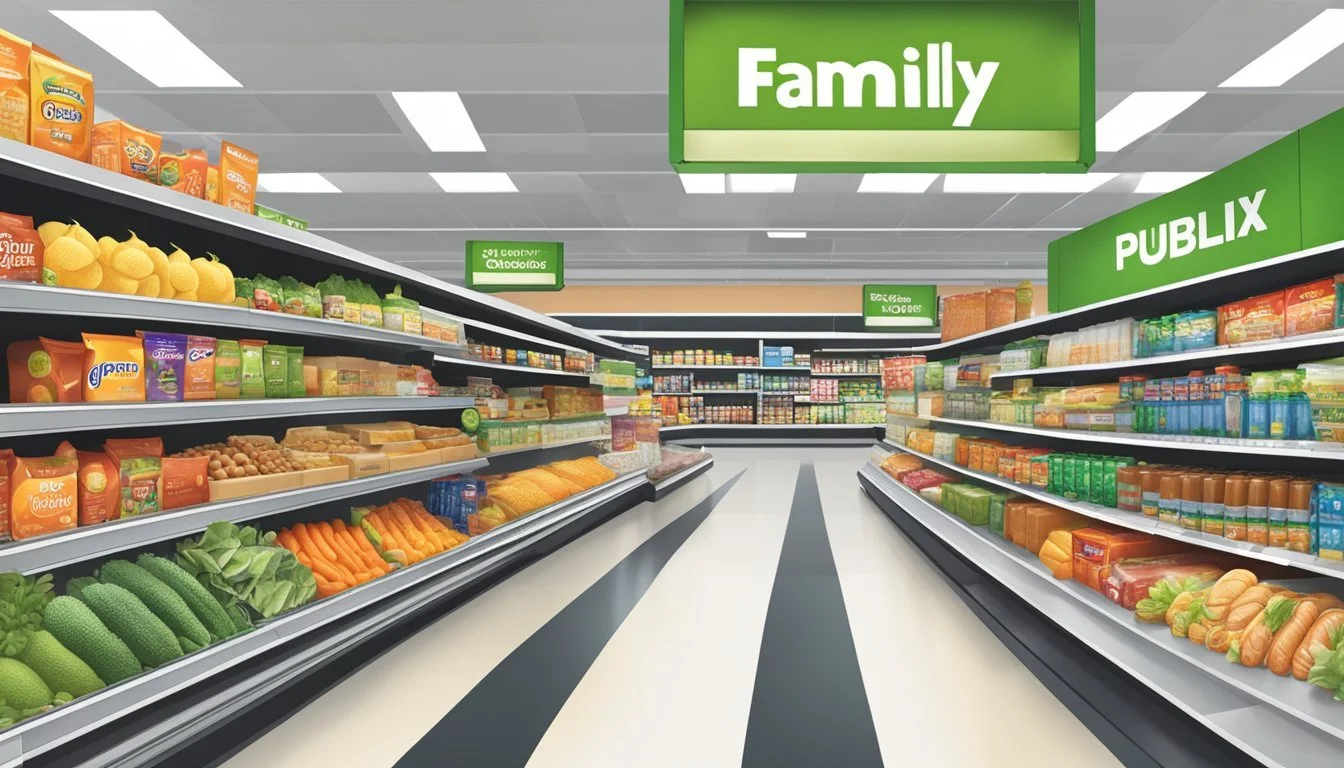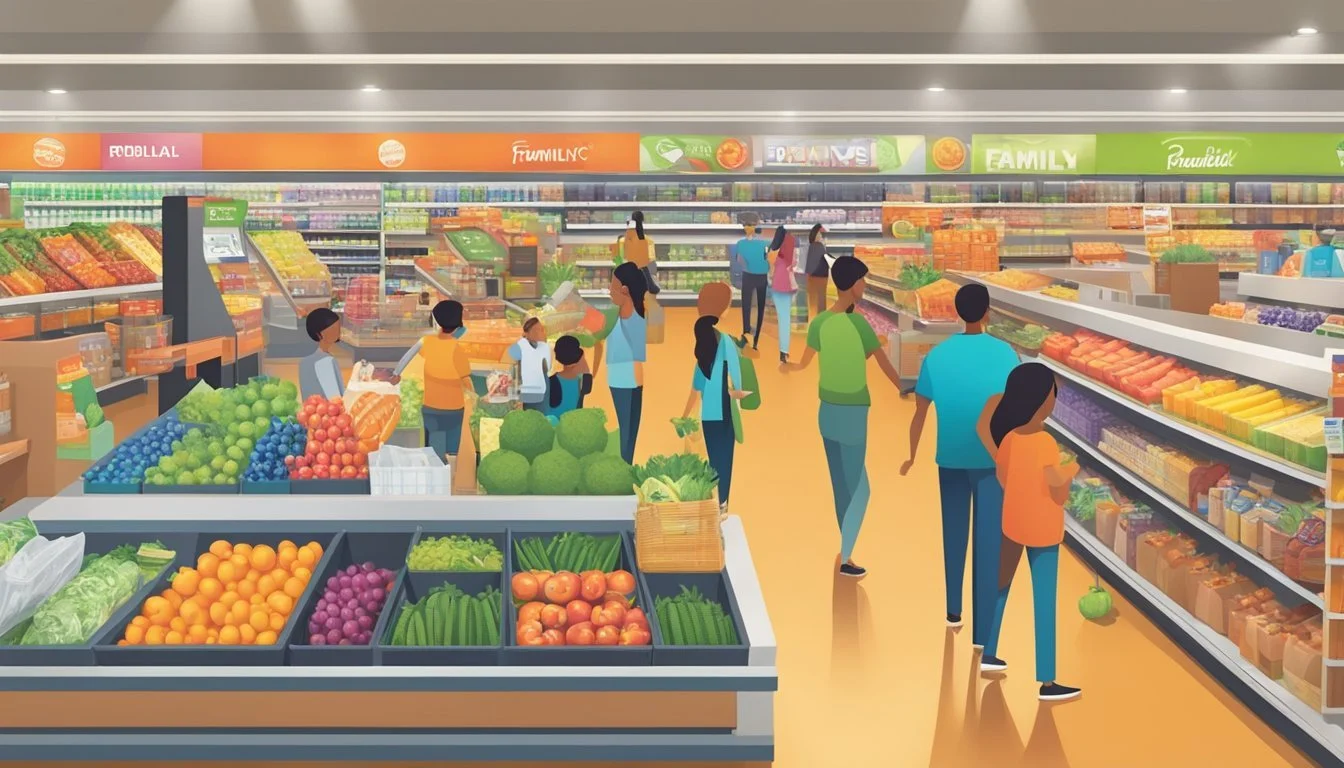Family Dollar vs Publix
Comparing Prices, Quality, and Selection
Family Dollar and Publix offer distinct shopping experiences for consumers seeking groceries and household essentials. While Family Dollar focuses on providing low-cost items in a no-frills environment, Publix aims to deliver higher quality products with superior customer service.
For budget-conscious shoppers, Family Dollar typically offers lower prices on many items compared to Publix. However, Publix often provides a wider selection of fresh produce, meats, and specialty products. The choice between the two largely depends on individual priorities and shopping needs.
Considering factors like price, product range, store atmosphere, and customer service can help shoppers determine which retailer best suits their preferences. Both chains have their strengths, catering to different segments of the market and fulfilling various consumer needs.
Company Profiles
Family Dollar and Publix are two prominent retailers with distinct histories and business models. Family Dollar focuses on discount merchandise, while Publix is a major supermarket chain in the Southeast.
History of Family Dollar
Family Dollar was founded in 1959 by Leon Levine in Charlotte, North Carolina. The company grew rapidly, expanding to over 8,000 stores across 46 states by 2015. In 2015, Dollar Tree acquired Family Dollar for $8.5 billion, creating a combined entity with over 13,000 stores nationwide.
Family Dollar stores typically occupy smaller retail spaces and offer a mix of groceries, household items, and clothing at discounted prices. The chain competes directly with other discount retailers like Dollar General and its parent company Dollar Tree.
Profile of Publix Super Markets
Publix Super Markets was established in 1930 by George W. Jenkins in Winter Haven, Florida. The company has grown to become the largest employee-owned grocery chain in the United States, with over 1,200 stores across seven southeastern states.
Publix is headquartered in Lakeland, Florida, and is known for its high-quality customer service and fresh produce. The company has consistently ranked highly in customer satisfaction surveys and industry rankings.
Publix stores are typically larger than Family Dollar locations, averaging around 55,000 square feet. The company offers a wide range of products, including groceries, prepared foods, and pharmacy services. Publix has also introduced its GreenWise Market concept, focusing on organic and natural products.
Store Locations and Accessibility
Family Dollar and Publix have distinct geographic footprints. Family Dollar operates nationwide, while Publix maintains a strong presence in the southeastern United States.
Family Dollar's Nationwide Presence
Family Dollar boasts over 8,000 stores across 46 states. The chain's widespread distribution makes it accessible to a large portion of the U.S. population.
Urban areas and small towns alike often have Family Dollar locations. The company strategically places stores in diverse neighborhoods, including low-income and rural communities.
Family Dollar's expansion has focused on filling gaps in underserved markets. This approach has led to a high density of stores in certain regions, particularly in the South and Midwest.
Publix's Influence in the South
Publix operates over 1,300 stores concentrated in seven southeastern states. Florida, the company's home state, hosts the majority of Publix locations with more than 800 stores.
The supermarket chain has a significant presence in Georgia, Alabama, South Carolina, North Carolina, Tennessee, and Virginia. Publix continues to expand within these states, opening new stores and distribution centers.
Publix stores are typically found in suburban areas and planned communities. The company carefully selects locations based on population density and income levels.
In Florida, Publix enjoys near-ubiquitous coverage, with stores often within a short drive of most residents. This dominance extends to other southeastern states, albeit to a lesser degree.
Pricing and Value Proposition
Family Dollar and Publix offer distinct pricing strategies and value propositions to attract different customer segments. Their approaches to everyday prices and savings opportunities reflect their unique market positions and target demographics.
Comparing Everyday Prices
Family Dollar focuses on providing low-cost options for budget-conscious shoppers. Their everyday prices tend to be lower than traditional supermarkets, especially on household essentials and packaged goods. Many items are priced at $1 or less.
Publix, in contrast, positions itself as a premium grocer. Their regular prices are typically higher than discount chains. A standard basket of 37 grocery items at Publix costs around $129.54, based on a 2021 price comparison.
Family Dollar emphasizes value through a no-frills shopping experience and smaller store formats. Publix justifies higher prices with superior customer service, store ambiance, and product quality.
Discounts and Savings Opportunities
Family Dollar offers weekly specials and digital coupons through their Smart Coupons program. Customers can find discounts on select items, often ranging from 10-50% off regular prices.
Publix is known for its BOGO (Buy One Get One) deals on popular products. They also provide digital coupons and a robust weekly ad with competitive prices on featured items.
Both stores have loyalty programs. Family Dollar's Smart Coupons allows customers to clip and redeem digital offers. Publix's Club Publix offers personalized deals and early ad access.
For extreme savings, some shoppers combine store promotions with manufacturer coupons. This strategy can yield significant discounts at both retailers, though policies may vary.
Product Range and Quality
Family Dollar and Publix offer distinct shopping experiences with varying product selections and quality standards. Their approaches to grocery and household items cater to different customer needs and preferences.
Assortment of Grocery Items
Family Dollar provides a limited selection of grocery essentials and household items. Their inventory focuses on packaged foods, snacks, and basic pantry staples. The store typically stocks a small range of frozen foods, dairy products, and canned goods. Family Dollar's private-label brands are prominently featured alongside some national brands.
Publix, in contrast, offers a comprehensive grocery selection. Their stores feature extensive produce departments, full-service meat and seafood counters, and well-stocked bakeries. Publix carries a wide variety of national brands, specialty items, and organic options. The deli section provides prepared foods, sandwiches, and party platters.
Quality of Fresh and Packaged Foods
Family Dollar's food quality aligns with its budget-friendly positioning. Fresh produce options are limited, with a focus on hardy fruits and vegetables. Packaged foods and frozen items make up the bulk of their grocery offerings. The quality of these products is generally acceptable for their price point.
Publix is known for its emphasis on quality across all departments. Their produce section features a diverse selection of fresh fruits and vegetables, including organic options. The meat department offers high-grade cuts and poultry. Publix's bakery produces fresh bread, cakes, and pastries daily. Their private-label brands, such as Publix Greenwise, are often comparable in quality to national brands.
Shopping Experience
The shopping experience at Family Dollar and Publix differs significantly in terms of store atmosphere, product selection, and customer service. These factors can greatly impact a shopper's overall satisfaction and likelihood of returning.
In-Store Amenities and Cleanliness
Family Dollar stores typically offer a no-frills shopping environment. Aisles are often narrow and packed with merchandise. The focus is on value rather than ambiance.
Publix, in contrast, provides a more upscale atmosphere. Stores are generally spacious and well-lit. The produce section is usually a highlight, with fresh fruits and vegetables attractively displayed.
Cleanliness is a priority at Publix. Floors are regularly mopped, and shelves are kept tidy. Many locations feature in-store bakeries and delis, offering freshly prepared foods.
Publix also boasts a reputable seafood department. Knowledgeable staff can provide cooking tips and recommendations.
Checkout Efficiency and Customer Service
Family Dollar typically has fewer checkout lanes than Publix. This can lead to longer wait times during busy periods. Self-checkout options are limited or nonexistent in most Family Dollar stores.
Publix is known for its emphasis on customer service. Cashiers are trained to be friendly and efficient. Many stores offer "express lanes" for customers with fewer items.
The "Publix Guarantee" ensures satisfaction with purchases. If a customer is unhappy with a product, Publix will refund or replace it, no questions asked.
Publix employees often assist with bagging groceries and may even help carry them to a customer's car. This level of service is not typically found at Family Dollar locations.
Additional Services and Features
Family Dollar and Publix offer distinct services beyond basic grocery shopping. These additional features can significantly impact the overall customer experience and convenience.
Pharmacies and Health Services
Publix operates full-service pharmacies in most of its locations. These pharmacies provide prescription fulfillment, immunizations, and health screenings. Publix pharmacists offer medication counseling and can answer health-related questions. The store also provides free prescriptions for certain medications.
Family Dollar does not have in-store pharmacies. However, some locations sell over-the-counter medications and basic health supplies. This limits their ability to serve customers with prescription needs or those seeking professional health advice.
Online Shopping and Curbside Pickup
Publix has embraced digital shopping options. Customers can place orders through the Publix website or mobile app. The store offers curbside pickup at many locations, allowing shoppers to collect their groceries without entering the store.
Family Dollar's online presence is more limited. While they have a website showcasing products and deals, they do not offer comprehensive online ordering or curbside pickup services. This puts them at a disadvantage for customers seeking contactless shopping options.
Both stores provide mobile apps, but Publix's app offers more functionality, including digital coupons and personalized deals.
Loyalty Programs and Customer Engagement
Family Dollar and Publix offer distinct loyalty programs and customer engagement strategies to attract and retain shoppers. Both chains aim to provide value through various savings opportunities and communication channels.
Membership Benefits and BOGO Deals
Family Dollar's Smart Coupons program allows customers to load digital coupons onto their account for in-store savings. The retailer frequently offers BOGO deals on select items to stretch shoppers' budgets.
Publix's Club Publix loyalty program ranks highly among supermarket rewards offerings. Members receive personalized deals, early ad access, and the ability to view purchase history. Publix is renowned for its frequent BOGO promotions across various product categories.
Club Publix members can easily clip digital coupons and track their savings. The program integrates seamlessly with the Publix app for a convenient shopping experience.
Communication and Newsletters
Family Dollar communicates deals through weekly ads and emails. Subscribers receive notifications about upcoming sales and exclusive discounts.
Publix engages customers through its weekly ad, digital coupons, and personalized emails. Club Publix members get tailored communications based on their shopping habits.
The Publix website and app provide easy access to current promotions and digital coupons. Customers can create shopping lists and view recipe ideas tied to on-sale items.
Both retailers use social media to share deals and interact with customers. Publix tends to have a more active social presence compared to Family Dollar.
Comparison to Other Retailers
Family Dollar and Publix compete with a variety of retailers in the grocery and discount store markets. Each faces unique challenges and opportunities when compared to their competitors.
Family Dollar and Dollar Store Competitors
Family Dollar competes directly with other dollar store chains like Dollar General and Dollar Tree. These stores offer similar low-price merchandise and basic grocery items. Family Dollar tends to have slightly higher prices than Dollar Tree but a wider selection of name-brand products.
Compared to Walmart, Family Dollar has smaller stores and a more limited grocery selection. However, Family Dollar locations are often more conveniently located in urban and rural areas. The company has been expanding its grocery offerings to better compete with discount supermarkets like Aldi.
Publix Versus Traditional Supermarkets
Publix faces competition from large national chains like Kroger and regional supermarkets. Publix stores are known for cleanliness, customer service, and high-quality store brands. This helps Publix cultivate a loyal customer base despite sometimes higher prices than competitors.
Unlike Walmart or Target, Publix focuses exclusively on groceries and related items. This allows for a more curated selection. Publix has managed steady growth, especially in the Southeast, by emphasizing fresh foods and prepared meals.
Compared to Trader Joe's, Publix offers a much wider selection of name brands and staple items. However, Trader Joe's has developed a stronger cult following for its unique private-label products. As an employee-owned company, Publix promotes a strong service culture that differentiates it from many rivals.








